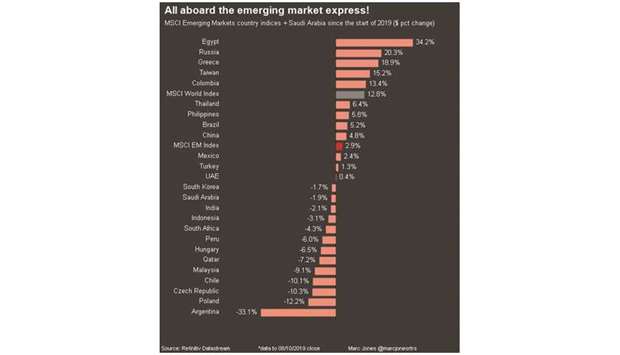Any hope of a breakthrough was quashed after Washington widened its trade blacklist to include some of China’s top artificial intelligence startups, while China sought to tighten visa restrictions for US nationals with ties to anti-China groups.
In the wake of the decision to blacklist Chinese companies, Goldman Sachs said it was reviewing its involvement in Megvii Technology Ltd’s planned initial public offering. Beijing shares closed marginally higher, but losses in Hong Kong- and Taiwan-listed stocks dragged the MSCI EM equities index lower by 0.3%.
“With news flows moving in a backwards direction, it is difficult to see how any progress is going to be made in trade talks which suggest equity markets should struggle,” Stephen Innes from AxiTrader wrote in a client note.
Currencies largely held steady as the dollar was wobbly following remarks from Federal Reserve chairman Jerome Powell who flagged further rate cuts and bond buying.
The Turkish lira steadied after its worst two-day decline in seven weeks, with an aide of President Tayyip Erdogan saying Turkish forces will cross the Syrian border “shortly” as the country wages a military incursion against a Syrian Kurdish militia.
Bloomberg reported, citing sources, that Turkish state banks bought about $1bn worth of lira this week to support the currency.
The Russian rouble and the South African rand gained 0.4% and 0.7%, respectively, while the Thai baht — the strongest performing Asian currency in 2019 — hit over a six-year high even as the central bank remained worried about the strength of the currency.
In eastern Europe, the Hungarian forint edged lower versus a firm euro even as the country posted a trade surplus of €37mn ($40.62mn) in August, beating analysts’ €50mn deficit forecast in a Reuters poll.
However, soft inflation data this week continued to support the central bank’s view of interest rates remaining on hold.
Minutes from the latest monetary policy meeting are due later in the day.
Ecuador benchmark bonds hit their lowest in almost a year after fierce protests at fuel price hikes saw President Lenin Moreno move the government out of Quito to the coastal city of Guayaquil, having already declared a state of emergency.
“At this point the risks are rising, but it’s too early to call (which way it will go),” said Koon Chow, EM FX and macro analyst at UBP.
“Eurobonds total $19bn which is roughly 19% of GDP, so it’s a decent amount.
It’s not Argentina (where dollar debt is 30% of GDP), but there are some echoes there.”

